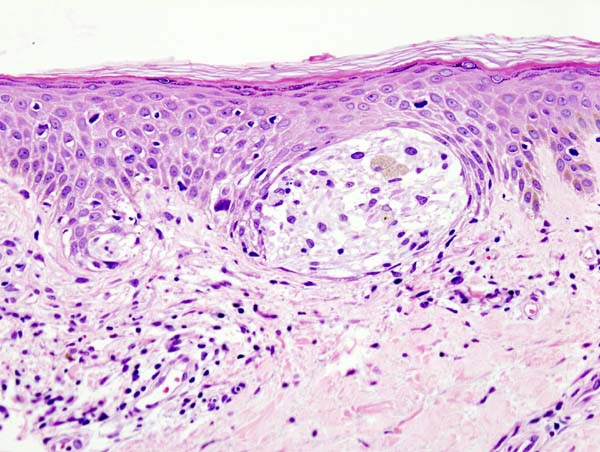
Androgen receptor (AR) signaling affects response to BRAF/MEK inhibitor therapy in both males and females with melanoma, researchers from The University of Texas MD Anderson Cancer Center showed in a study published today in Nature. The findings provide a new target to combat therapeutic resistance and one possible answer to why men face a poorer prognosis than women when diagnosed with melanoma.
The AR is a type of nuclear receptor that’s activated by the male sex hormone testosterone. Females have lower levels of androgens, including testosterone. This research confirms the impact of biological sex on response to BRAF/MEK targeted therapy and shows for the first time that these inhibitors increase AR signaling, leading to therapeutic resistance and poor response to treatment. In preclinical models of melanoma, blocking the AR improved response to BRAF/MEK targeted therapy in both males and females.
“This study, coupled with other recent publications looking at the impact of AR signaling on response to other types of cancer therapies, such as immune checkpoint blockade, has enormous implications for the field,” said senior corresponding author Jennifer Wargo, M.D., professor of Genomic Medicine and Surgical Oncology. “We know males and females get cancer at different rates and have different mortality. Our research raises the possibility that the AR and testosterone may be at play and offers a new target to improve response to treatment in both sexes.”
Biological sex matters for targeted therapy response in melanoma
The study began with an observation from a neoadjuvant clinical trial for BRAF/MEK inhibitors in stage III melanoma (NCT02231775) where female patients had a higher rate of major pathologic response (MPR, defined as <10% viable tumor at time of surgery) rates and recurrence-free survival (RFS) rates than male patients.
To validate these findings, the group studied additional patients with locally advanced metastatic melanoma, including 51 patients treated with neoadjuvant BRAF/MEK inhibitors (30 females and 21 males). The MPR rate was 66% for females and 14% for males, and the two-year RFS rate was 64% for females and 32% for males.
After ruling out other possible factors contributing to MPR—including age, performance status, body mass index (BMI), stage of disease and mutation status—the research team validated the sexual dimorphism in several other cohorts. The analysis included a total of 664 patients who received BRAF- and/or MEK-targeted therapy for stage III or stage IV melanoma. In multiple studies, the researchers found a trend toward improved progression-free survival (PFS) and overall survival (OS) in females versus males.
Longitudinal evaluation of available tissue samples revealed significantly higher levels of AR in male patients during treatment compared to baseline, and significantly higher levels of AR during treatment in male and female patients whose cancer did not respond to the targeted therapy combination.
Role of AR signaling validated in preclinical studies
In collaboration with MD Anderson’s Translational Research to Advance Therapeutics and Innovation in Oncology (TRACTION) platform, the researchers validated their observational findings in several preclinical models.
“This study speaks to our commitment to transform patient care through a reverse translation strategy that is exemplified at MD Anderson,” said co-corresponding author Timothy Heffernan, Ph.D., vice president of oncology research in MD Anderson’s Therapeutics Discovery division and head of TRACTION.
First, they showed that female mice implanted with melanoma tumors respond better than male mice to BRAF/MEK inhibitor therapy. When all mice were given testosterone, tumor progression and treatment resistance occurred in both sexes. Finally, when mice were given an AR inhibitor plus targeted therapy, responses to melanoma treatment improved in both sexes.
“By using translational studies in patient samples alongside preclinical models, we showed that treatment with BRAF/MEK inhibitors is associated with upregulation of the AR on tumor cells, thus promoting resistance to therapy,” said co-corresponding author Joseph Marszalek, Ph.D., co-leader of TRACTION. “We found that blocking the AR actually improved treatment response in males and females, and that activating AR signaling with testosterone abrogated therapeutic response.”
Recent research showed that AR-mediated resistance may have an impact on other cancers and types of treatment. The current findings emphasize the need to better understand the impact of receiving hormone therapy while undergoing BRAF and/or MEK inhibitor therapy for melanoma and other cancers.
Source: Read Full Article
